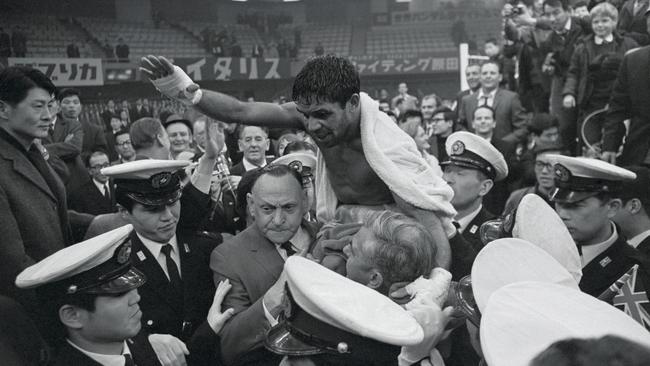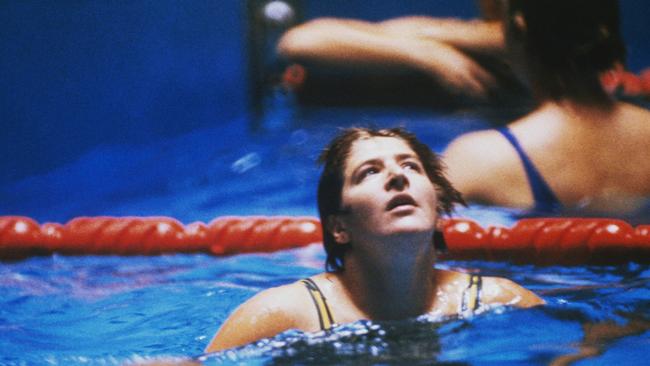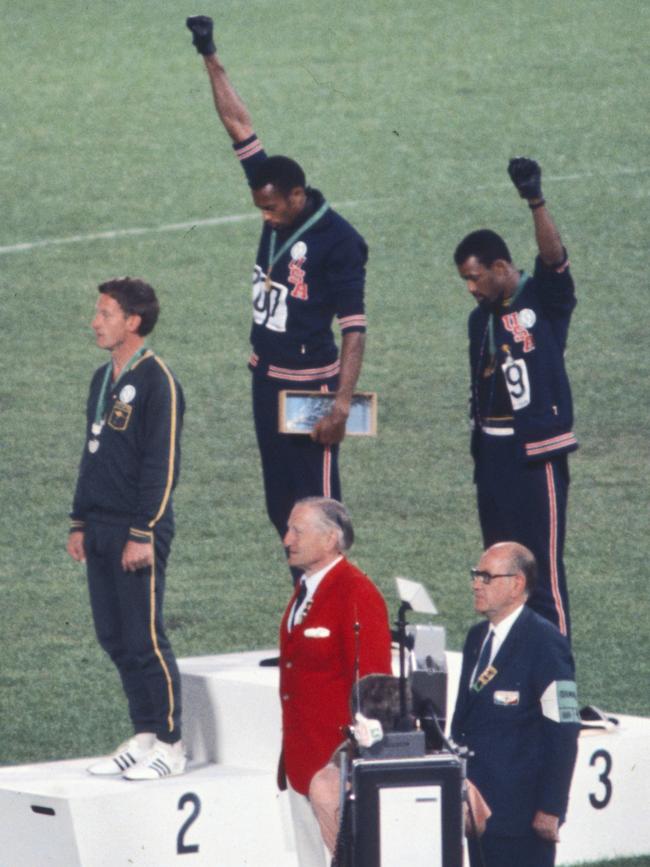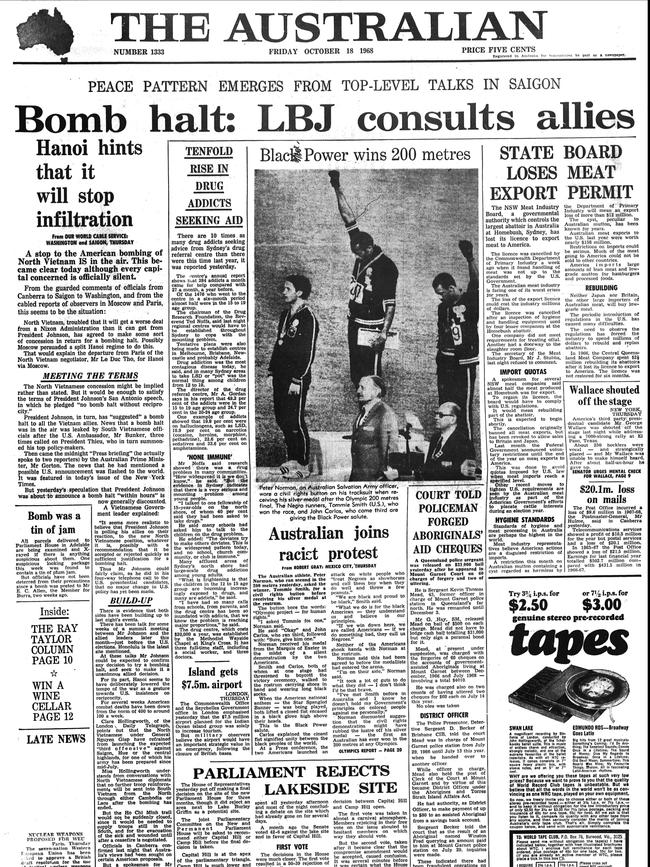When Australia’s sportsmen and women truly punched above their weight
Boxer Lionel Rose became world champion, Dawn Fraser stunned with an Olympic threepeat - and then was banned - while Peter Norman’s sprint silver in Mexico was overrun by a Black Power salute. The Australian’s sport coverage in the 1960s was never dull.

Boxer Lionel Rose stunned Australia by winning the world bantamweight title against Japan’s Masahiko “Fighting” Harada in 1968
ABORIGINAL BOXER ROSE DEFEATS HARADA FOR WORLD TITLE
- First published February 27, 1968

“I wouldn’t want to fight a man like Harada again in the next six months,” a tired but jubilant Lionel Rose said tonight.
Rose, a 20-year-old Victorian, had just become the second Australian since the war to win a world boxing title – and the first Aboriginal. He beat Japan’s Fighting Harada for the bantamweight title on points over 15 rounds before 8000 people at the Nippon Budokan Hall in Tokyo. The decision by the referee and two judges – all Japanese – was unanimous.
The referee scored the fight 72-71 for Rose and the judges 72-69 and 72-70.
By his victory for the bantamweight crown, Rose follows Jimmy Carruthers, who won the title in the same division in 1952 and retired undefeated in 1954.
In his dressing room after the fight, Rose said: “Harada is a very tough fighter.
“I thought I had him in the 13th round – a right hand to the chin caused him to waver a bit.
“It was a real hard fight.”
A big crowd of Australians who flew to Japan for the fight mobbed Rose after his victory.
They had cheered and encouraged him loudly throughout the contest.
Good left
When Rose’s hand was raised in victory, his trainer, Jack Rennie, of Melbourne, rushed into the ring and embraced him.
Rennie tripped and fell down, with Rose on top of him.
Later, the exultant Rennie said: “I was confident all the way that Rose would beat Harada. I attribute his victory to his good left hand. He boxed like a champion. My only worry was whether the Japanese judges would give him the decision.”
But Rennie added that he was surprised by the close scorecards.
“I thought Lionel won by a larger margin,” he said.
Rose could defend his title for the first time in Japan.
Rennie said he had received a good offer for the defence there and would probably accept.
Rennie said: “Everyone has been wonderful to us in their treatment here in Tokyo and I’m in favour of Rose making his first title defence here.
“But the title fight has to be in summer when it’s warmer.”
However, a London message last night said the British promoter, Jack Solomons, was cabling a big offer to Rennie for Rose to defend the title against Walter McGowan, of Scotland.
Rose’s victory was watched from the ringside by Mrs Shirley Rennie, who has cooked all the champion’s food since he arrived in Tokyo.
Most of the food had been flown from Australia to avoid upsetting Rose’s diet.
Rose, rated No 6 contender by the World Boxing Association, was unknown before he came to Japan but amazed the partisan crowd by taking command from the start.
Harada, 24, was a solid favourite to win but Rose proved he had a better technique and a harder punch.
Rose opened a cut on Harada’s forehead in the eighth round and followed near the end of the ninth by knocking down Harada for a compulsory eight count.
Harada, knowing he had to knock out Rose to win, tried desperately over the five final rounds, but Rose, using greater height and longer reach, kept the champion at long range.
However, he was reprimanded four times during the bout for hitting with an open glove.
In Melbourne, the Prime Minister, Mr Gorton, had just finished a speech to a group of Liberals at the Southern Cross Hotel when the fight ended. He rose to announce the result, which was greeted with applause.
Olympic champion Dawn Fraser, who had just won a historic third gold in a row for the 100m freestyle, challenged a 10-year ban imposed for misbehaviour by swimming at her local carnival. Dawn was never going to accept that sanction meekly.
DAWN MOBBED BY FANS AT SWIM IN ‘HER’ POOL
- First published March 4, 1965
The banned Olympic swimmer, Dawn Fraser, swam a two-lap exhibition in Sydney last night in the pool at Balmain that was renamed after her following her Gold Medal victory at the Tokyo Olympic Games.
Spectators gave her a huge ovation and children almost knocked her off her feet when she walked to the poolside in a blue tracksuit.
Her appearance came 48 hours after she was suspended for 10 years by the Australian Swimming Union.
The Victorian Amateur Swimming Association, with which she is registered, gave permission for her appearance because it has not been officially notified of her suspension.
She was invited to swim at the Dawn Fraser pool by the Birchgrove Ladies Amateur Swimming Club.
The pool was known as the Elkington Park pool before Miss Fraser’s Tokyo win.

A secret
Club officials kept secret the fact that Miss Fraser was going to appear at the carnival because they were frightened the Australian Swimming Union would take steps to stop her.
At the end of the exhibition, Miss Fraser covered her face with a towel to prevent photographers from taking pictures.
She refused to come out of the dressing room to speak to the press, but let a stream of small girls go in for autographs.
‘Good on you’
Her appearance left no doubt that Miss Fraser is still the idol of Balmain, the suburb where she has lived most of her life. Children shouted “good on you Dawn” as they pleaded for autographs.
After Miss Fraser reached the side of the pool, the announcer said: “Well, ladies and gentlemen, do you think she is not popular?”
Miss Fraser had walked down the hill half a mile from the house where she grew up to appear at the carnival.
“It’s a real Balmain scoop,” said the pool manager, Mr Ray Mirands, who was Miss Fraser’s first coach. “Dawn is still very upset over the suspension, but she promised to come tonight and she did,” he said.
Athlete Peter Norman’s support for a Black Power protest at the Mexico Olympics was front-page news on October 18, 1968. In time, Norman’s stand became an achievement more highly prized than his medal. The Americans were pallbearers at Norman’s funeral in 2006.
BLACK POWER WINS
- By Robert Gray. First published October 18, 1968
MEXICO CITY: The Australian athlete, Peter Norman, who ran second in the 200 metres yesterday, asked the winner, Tommie Smith, for a civil rights button before receiving his silver medal at the rostrum.
The button bore the words: “Olympic project – for human rights.”
“I asked Tommie for one,” Norman said.
He said “Okay” and John Carlos, who ran third, followed with: “Sure, give him one.”
Norman received his medal from the Marquis of Exeter in the midst of a silent demonstration by the two Americans.


Smith and Carlos, both of whom at one stage had threatened to boycott the victory ceremony, walked to the rostrum carrying shoes in hand and wearing long black socks.
When the American national anthem – the Star Spangled Banner – was being played, both lifted a closed fist encased in a black glove high above their heads.
This is the Black Power salute.
Carlos explained the closed fist signified unity between the black peoples of the world.
At a press conference, the two Americans launched an attack on white people who “treat Negroes as showhorses and call them boy when they do well and throw a few peanuts”.
“We are black and proud to be black,” Smith said. “What we do is for the black American – they understand us and believe in our principles.
“If we win down here, we are called Americans – if we do something bad, they call us Negroes.”
Neither of the Americans shook hands with Norman at the rostrum. Norman said this had been agreed to before the medallists had entered the arena.
“I’m on their side,” Norman said. “It took a lot of guts to do what they did – I don’t think I’d be that brave. I’ve met Smith before in Australia and I know he doesn’t hold my government’s principles on coloured people against me personally.”

To join the conversation, please log in. Don't have an account? Register
Join the conversation, you are commenting as Logout